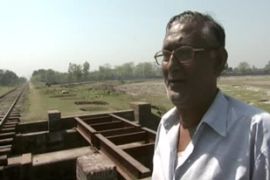Bangladeshis seek war crimes trial
Calls grow to punish those behind atrocities during country’s independence struggle.

A total of 1,600 people have been accused, including 456 Pakistani soldiers as well hundreds of locals who fought with Pakistan.
Justice denied
However, no one has yet been convicted for the atrocities and a combination of international manipulation and domestic politics are blamed for the judicial inaction.
Some of the accused, meanwhile, have gone on to become important ministers in subsequent governments.
| In Depth |
|
|
As calls for justice get shriller, a six-roomed rented house in Dhaka has been turned into a museum as a reminder of the dark period.
“I see a light at the end of the tunnel. the present government, the army chiefs, even the election commission people feel the need for such a tribunal to try the war criminals,” Akku Chowdhury, a former liberation fighter and the director of the museum, said.
“Hopefully we can also have an international tribunal where the Pakistani army officers who were responsible for such carnage will be tried also,” he told Al Jazeera.
According to Bangladeshi activists up to three million people were killed by Pakistan and its local allies. Pakistan denies the allegations and claims just 25,000 people were killed.
“Truth can come out only through trial so we want the truth, we want the light, we want to come out of darkness we are living today,” AK Khanker, a retired air vice-marshal, says.
Reign of terror
Tapan Das, a Hindu surivor of the 1971 massacre, is awaiting justice as well.
He lost 11 members of his family, including his father, elder brother, uncle and cousins, in the run-up to independence.
Das and many others were loaded into a train to be massacred. He escaped, but others were not as lucky.
“They were crying ‘help me help me, save me save me, oh god save me’, but no one there, no one there. They killed us one by one. Only 21 people, 21 young men we jump from the train and narrowly escaped,” Das says.
It’s not certain if Bangladesh will get justice and its day in court.
But until it does it will be difficult for many to move on, away from the memories of the terrible cost that was paid for the birth of a nation.
